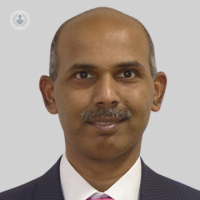How are Achilles tendon injuries treated?
Written in association with:In this article below, esteemed consultant trauma and orthopaedic surgeon, Mr Dakshinamurthy Sunderamoorthy, provides us with a comprehensive overview of all things Achilles tendon injuries.

What is the Achilles tendon?
The Achilles tendon, a robust band of tissue connecting the calf muscles to the heel bone, plays a vital role in walking, running, and jumping.
How do Achilles tendon injuries occur?
Achilles tendon injuries commonly occur as a result of overuse, sudden increases in physical activity, or uncomfortable footwear. Athletes, particularly runners and those involved in sports requiring quick bursts of acceleration, are at increased risk. Additionally, factors such as tight calf muscles, poor biomechanics, and inadequate warm-up routines can contribute to the likelihood of injury.
What are the associated symptoms?
Symptoms of an Achilles tendon injury may include pain and stiffness in the back of the heel, swelling, tenderness, and difficulty walking or standing on tiptoes. In severe cases, individuals may experience a popping sensation or hear an audible snap at the time of injury, indicating a ruptured tendon.
How are Achilles tendon injuries treated?
When it comes to treatment, early intervention is key to preventing further damage and promoting optimal healing. Initially, the RICE protocol (Rest, Ice, Compression, Elevation) can help alleviate pain and reduce inflammation. Non-steroidal anti-inflammatory drugs (NSAIDs) may also be recommended to manage pain and swelling.
In cases of mild to moderate Achilles tendonitis or partial tears, conservative treatments such as physical therapy, stretching exercises, and wearing supportive footwear or orthotics can facilitate recovery. Physical therapy focuses on strengthening the calf muscles and improving flexibility, while eccentric exercises, in which the muscle lengthens as it contracts, are particularly beneficial for Achilles tendon injuries.
For more severe injuries, such as complete Achilles tendon ruptures, surgical intervention may be necessary to repair the tendon and restore function. Surgical techniques may vary depending on the extent of the injury and the surgeon's preference, but typically involve suturing the torn ends of the tendon back together or using grafts to reinforce the repair.
To consult with Mr Dakshinamurthy Sunderamoorthy, visit his Top Doctors profile today.


